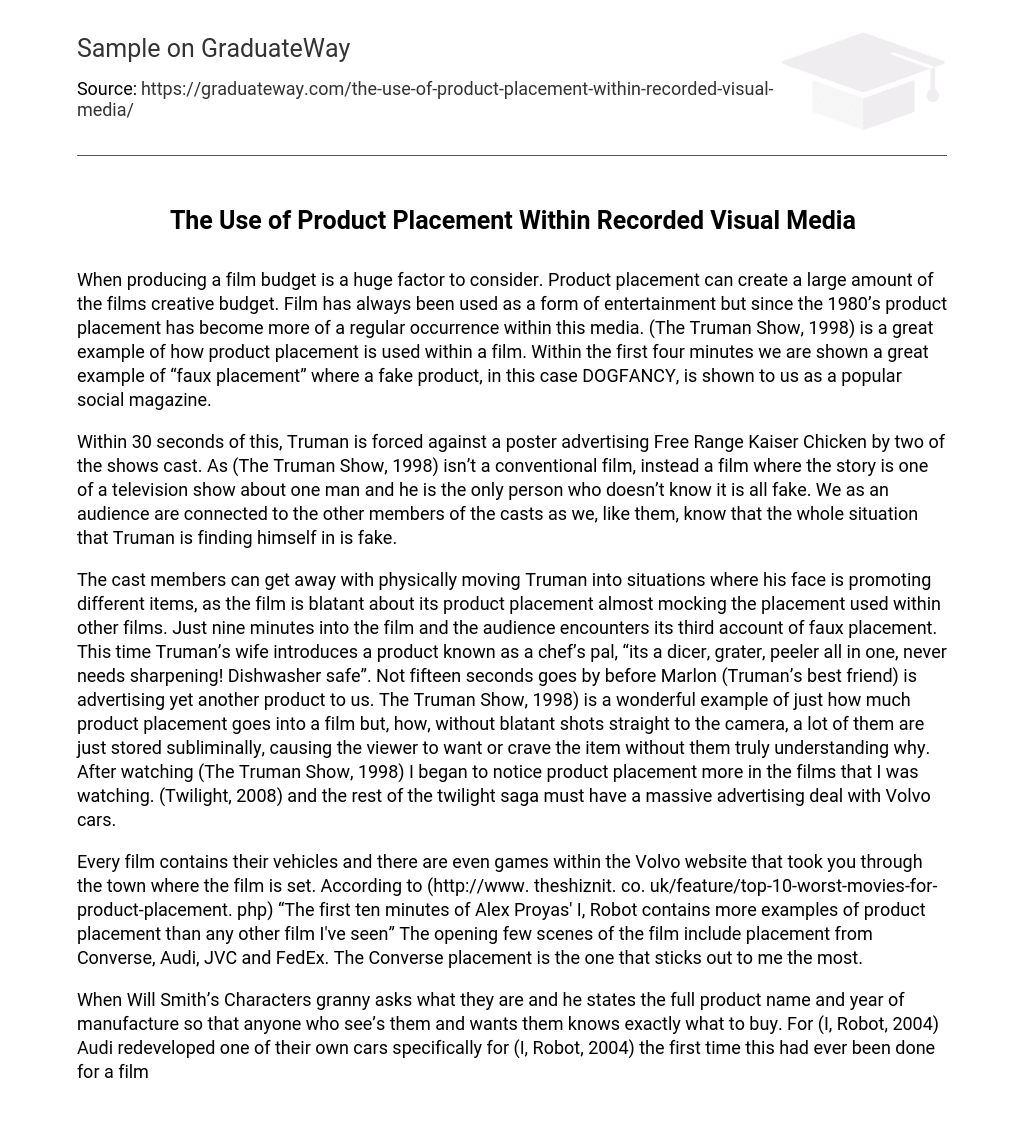When producing a film budget is a huge factor to consider. Product placement can create a large amount of the films creative budget. Film has always been used as a form of entertainment but since the 1980’s product placement has become more of a regular occurrence within this media. (The Truman Show, 1998) is a great example of how product placement is used within a film. Within the first four minutes we are shown a great example of “faux placement” where a fake product, in this case DOGFANCY, is shown to us as a popular social magazine.
Within 30 seconds of this, Truman is forced against a poster advertising Free Range Kaiser Chicken by two of the shows cast. As (The Truman Show, 1998) isn’t a conventional film, instead a film where the story is one of a television show about one man and he is the only person who doesn’t know it is all fake. We as an audience are connected to the other members of the casts as we, like them, know that the whole situation that Truman is finding himself in is fake.
The cast members can get away with physically moving Truman into situations where his face is promoting different items, as the film is blatant about its product placement almost mocking the placement used within other films. Just nine minutes into the film and the audience encounters its third account of faux placement. This time Truman’s wife introduces a product known as a chef’s pal, “its a dicer, grater, peeler all in one, never needs sharpening! Dishwasher safe”. Not fifteen seconds goes by before Marlon (Truman’s best friend) is advertising yet another product to us. The Truman Show, 1998) is a wonderful example of just how much product placement goes into a film but, how, without blatant shots straight to the camera, a lot of them are just stored subliminally, causing the viewer to want or crave the item without them truly understanding why. After watching (The Truman Show, 1998) I began to notice product placement more in the films that I was watching. (Twilight, 2008) and the rest of the twilight saga must have a massive advertising deal with Volvo cars.
Every film contains their vehicles and there are even games within the Volvo website that took you through the town where the film is set. According to (http://www. theshiznit. co. uk/feature/top-10-worst-movies-for-product-placement. php) “The first ten minutes of Alex Proyas’ I, Robot contains more examples of product placement than any other film I’ve seen” The opening few scenes of the film include placement from Converse, Audi, JVC and FedEx. The Converse placement is the one that sticks out to me the most.
When Will Smith’s Characters granny asks what they are and he states the full product name and year of manufacture so that anyone who see’s them and wants them knows exactly what to buy. For (I, Robot, 2004) Audi redeveloped one of their own cars specifically for (I, Robot, 2004) the first time this had ever been done for a film. (I, Robot, 2004) wasn’t the first film to feature Audi cars. Audi has been advertising in major films for years, being the feature car in such films as “Ronin”, “Mission Impossible II” and “Transporter II” and most recently the Iron Man films.
With (I, Robot, 2004) getting over 55 million viewers Audi’s cars were exposed to approximately 1% of the world. This may sound like nothing but the film was seen in over 40 countries, this gave Audi a huge audience and a powerful advertising tool. I watch a large amount of films every year and have noticed that product placement is becoming a more prominent part in modern films. After looking at (I, Robot, 2004) I noticed that films that either star or are produced by Will Smith are saturated with product placement from start to finish. I Am Legend, 2007) Three minutes into the film, after being shown around a wasteland of a city with everything rusting or falling apart, a brand new shiny muscle car comes into shot. Within a few seconds it becomes apparent that it is a Ford Mustang Shelby GT 500 SVT. A car that was only just being released at the same time as the film came out, what more could a car manufacturer ask for than the first few minutes of a Hollywood blockbuster showcasing just what their brand new car can do.
As soon as the car has left the screen we are shown the “ever so subtle” McDonalds M along with massive billboards advertising Wicked the Musical and Q magazine. But the piece of product placement that I notice the most is when Will Smith’s character has (Shrek, 2001) on the TV and is reciting the lines. This film wasn’t even produced by the same company that was producing (I Am Legend, 2007) they had paid a very large sum of money to get their film, their





